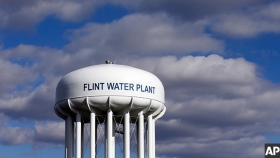You are here
Grants On Tap: Funders Support Clean Drinking Water

This post was authored by HEFN Director Karla Fortunato. It originally appeared on Health Affairs Blog’s GrantWatch section, September 23, 2016, http://healthaffairs.org/blog/2016/09/23/grants-on-tap-funders-support-c..., ©2016 Health Affairs by Project HOPE-The People-to-People Health Foundation, Inc.
With the widespread media coverage of Flint, Michigan’s water crisis, cities, advocacy groups, and philanthropy have adjusted their assumption that the country’s laws and infrastructure assure the public safe and healthy drinking water.
Since coverage began more than a year ago, the media has reported on contaminated drinking water, water scarcity, lead pipelines, and flaws in the nation’s drinking water infrastructure and regulations in cities and towns across the country.
Water-focused grant making isn’t new for philanthropy. Environmental philanthropy generally has focused on conservation, source water protection, stormwater infrastructure, and, in the West, water scarcity. Health philanthropy has focused on access to water and nutrition. In light of new information, however, foundations across health–environment portfolios are rethinking their commitments and considering new investments that would focus squarely on ensuring universal access to healthy and affordable drinking water.
Earlier this year, two webinars were organized to help funders understand what had happened, and what was happening, in Flint, and then, what the implications from that crisis were for our national drinking water infrastructure. Twelve different funder (affinity) groups sponsored the calls, and the webinars were incredibly well attended with well over one hundred funders joining each of the programs.
This summer, in response to the burgeoning media and philanthropic attention, the Health and Environmental Funders Network (HEFN) surveyed foundations interested or engaged in grant making focused on healthy and affordable drinking water, aiming to better understand what foundations are doing and what more is needed to ensure our nation’s drinking water is healthy and affordable. The results—from twenty foundations—are in.
Most of the survey respondents, fifteen of the twenty, are already making grants related to clean drinking water. Like they do with many other environmental health issues, foundations are approaching this issue from a number of different perspectives—from a concern for children’s health to watershed protection to environmental justice. Despite the variety of goals, respondents seemed to have a shared sense of the most urgent needs at this moment, including support for community organizing, government oversight and accountability, and advocacy.
Looking forward, foundations have developed, and are still developing, a variety of strategies, both to respond to the Flint crisis and to improve access to clean drinking water around the United States.
Develop A New National Model
With all eyes on Flint, Michigan, where citizens were exposed to high levels of lead as well as other contaminants, ten foundations are investing nearly $125 million to help the community recover. The goals of this initiative begin with ensuring access to safe drinking water and meeting the health needs of the residents, but they go farther to include supporting early education, supporting community engagement efforts, boosting the local nonprofit infrastructure, and supporting efforts to revitalize the local economy. This work could be a model for foundations, nongovernmental organizations (NGOs), and decision makers to use as a reference, as many communities around the country face environmental health injustices similar to the one in Flint.
Invest Locally
Issues with drinking water, as with other water issues, vary by place, with regional differences driving challenges and needs. For example, in the West, water scarcity creates the challenge (and need!). In the Midwest, communities are challenged by contamination related to agricultural chemicals and by climate-related algal blooms. Still other places are challenged by aging infrastructure, including lead pipes. And, of course, the issues are not singular, and that requires many water utilities to address multiple challenges.
Given this, it’s critical that investments be made at the local level, too. Communities need resources to organize and participate in decision making. Additionally, they require technical resources, like water monitoring and drinking water expertise to better understand the local issues and alternatives for addressing them.
The California Endowment has made significant investments in the Central Valley of California, the state’s main farming area or “breadbasket.” This part of California has long struggled with water contamination and scarcity issues. While the foundation acknowledges the need for government to ensure access to safe and healthy water, it has supported local organizations to provide short-term help for these communities, including installation of “hydration stations” throughout the communities—for example, at schools and libraries.
Connect The Efforts
While many drinking water efforts are happening at the local level, funders are supporting networking to enable groups to share lessons learned, models, and policy ideas. For example, theW. K. Kellogg Foundation supports the National Drinking Water Alliance, which is connecting leaders across the country on drinking water access, safety, research, policy, and partnership.
Bolster National Expertise
Of course, there are national drinking water policy campaigns that could help raise the bar on the quality of drinking water around the country. Several foundations are supporting national environmental organizations like NRDC (Natural Resources Defense Council), Clean Water Fund, and EDF (Environmental Defense Fund) for work to strengthen access to clean drinking water by advocating for national legislation, like the Clean Water Act and the Safe Drinking Water Act.
Some foundations are also connecting drinking water to their other environmental work. For example, the Pisces Foundation is supporting the NRDC’s efforts to help cities and towns plan for the climate-related drinking water obstacles those places expect to encounter. The Kresge Foundation is supporting a Carpe Diem West webinar series on climate change, Western US water, and public health.
Use The Other 95 Percent
Still other foundations are flexing their financial muscle by using their investment holdings to influence water access. The Park Foundation has long supported groups working to protect the nation’s drinking water. Alongside its traditional grant making, the Park board of trustees increases its foundation’s impact by filing shareholder resolutions; voting its stock proxies along environmental, social, and governance guidelines; and engaging with the media to raise awareness of drinking water issues.
The Next Steps
Flint’s tragedy and subsequent reports on contaminated drinking water across the country have made clear that our national drinking water infrastructure is failing to protect public health. While philanthropy cannot replace lead pipelines, it can support a variety of ongoing and new efforts to bring our drinking water infrastructure into the twenty-first century—from supporting advocacy to modernize dated laws and standards to reflect current scientific consensus, to investing in water monitoring technologies, to supporting community engagement and organizing.
Funders will be meeting in Oakland, California, on November 14, 2016, to learn and strategize together about improving national access to clean water. For more information, visit this page.
Related Reading:
“Funders Support Projects On Water And Sanitation,” by Lee-Lee L. Prina, GrantWatch column,Health Affairs, October 2014.
From our Blog
Upcoming Events
|
Jul 29 2024 Zoom |
Jul 30 2024 Zoom |

